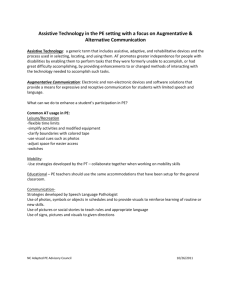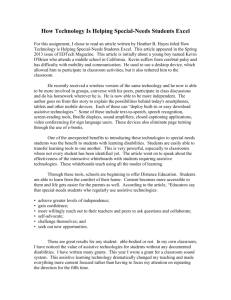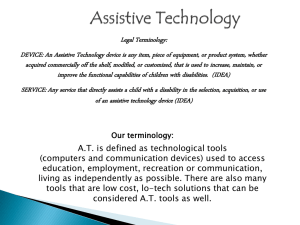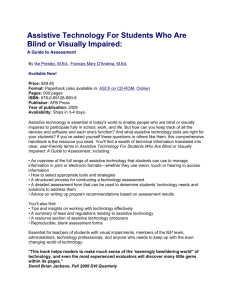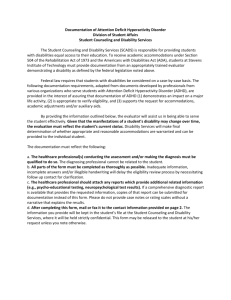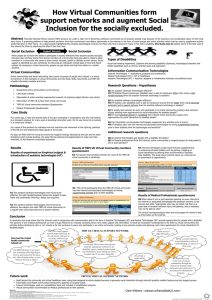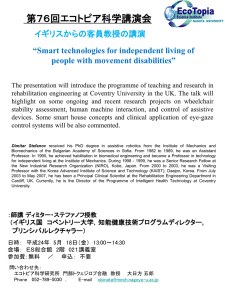Learning Disability and ADHD - Advisor Guidelines
advertisement
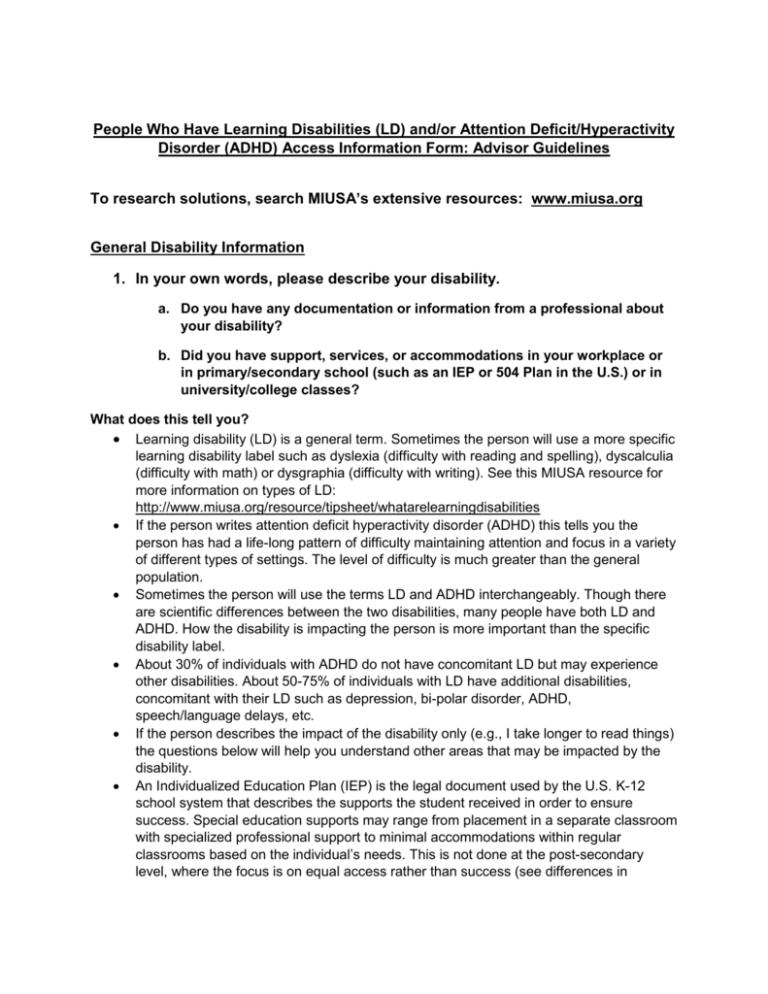
People Who Have Learning Disabilities (LD) and/or Attention Deficit/Hyperactivity Disorder (ADHD) Access Information Form: Advisor Guidelines To research solutions, search MIUSA’s extensive resources: www.miusa.org General Disability Information 1. In your own words, please describe your disability. a. Do you have any documentation or information from a professional about your disability? b. Did you have support, services, or accommodations in your workplace or in primary/secondary school (such as an IEP or 504 Plan in the U.S.) or in university/college classes? What does this tell you? Learning disability (LD) is a general term. Sometimes the person will use a more specific learning disability label such as dyslexia (difficulty with reading and spelling), dyscalculia (difficulty with math) or dysgraphia (difficulty with writing). See this MIUSA resource for more information on types of LD: http://www.miusa.org/resource/tipsheet/whatarelearningdisabilities If the person writes attention deficit hyperactivity disorder (ADHD) this tells you the person has had a life-long pattern of difficulty maintaining attention and focus in a variety of different types of settings. The level of difficulty is much greater than the general population. Sometimes the person will use the terms LD and ADHD interchangeably. Though there are scientific differences between the two disabilities, many people have both LD and ADHD. How the disability is impacting the person is more important than the specific disability label. About 30% of individuals with ADHD do not have concomitant LD but may experience other disabilities. About 50-75% of individuals with LD have additional disabilities, concomitant with their LD such as depression, bi-polar disorder, ADHD, speech/language delays, etc. If the person describes the impact of the disability only (e.g., I take longer to read things) the questions below will help you understand other areas that may be impacted by the disability. An Individualized Education Plan (IEP) is the legal document used by the U.S. K-12 school system that describes the supports the student received in order to ensure success. Special education supports may range from placement in a separate classroom with specialized professional support to minimal accommodations within regular classrooms based on the individual’s needs. This is not done at the post-secondary level, where the focus is on equal access rather than success (see differences in accommodations at http://www.chapman.edu/students/health-and-safety/disabilityservices/differences.aspx). A 504 Plan is often provided for students with ADHD who need accommodations within the regular classroom such as extended time on tests or assignments. International students or older students from the U.S. may not have had access to special education or support services in the school system or used different terminology. Similarly, disability support services at the higher education level are less common outside of the U.S. What follow up questions could you ask? When were you first diagnosed? What this tells you: Some individuals are diagnosed at a young age when they first enter school. These individuals may have had more opportunity to learn about themselves and practice selfadvocacy skills. In some cases, U.S. youth who have been on an effective IEP plan for a long time may actually not have much experience personally advocating for themselves as arrangement have always been made for them. Others are not identified until much later. This is sometimes a reflection of a bright young person who compensated on their own for many years. The individual may not be as experienced in talking about their disability and accommodation needs. Did you receive services in school? What this tells you: There are a wide range of services offered in school. If a youth is receiving special education services (such as having an IEP), s/he may be used to having someone that oversees and monitors the services provided. If a person attended a school specifically for students with LD/ADHD, s/he often has developed many compensation strategies and self-advocacy skills. If the person indicates no prior services in a school setting, it may be that services for LD and/or ADHD were either limited or not available in the person’s home country. Have you developed specific compensation strategies that help you? Explain. What are your strengths? What this tells you: The person has developed an understanding of him/herself and already has some selfadvocacy skills. Reading, Writing, and Math 2. Do you have difficulty with reading? a. Do you use a human reader? i. If yes, in what situations do you use a human reader? ii. Typically, who is your human reader? What does this tell you? Some people have lifelong difficulty decoding and reading words even though their ability to understand the material may be very strong. Sometimes with adults difficulty decoding words results in a very slow reading rate. Hearing material read aloud enables the person to comprehend. A human reader may have been the only option available, and the reader is often a family member or a friend. For some individuals, this support is only used in “high stakes” reading situations such as during an academic test or exam. What follow up questions could you ask? Typically, what tasks do you have the person read? Do you use friends, family, or volunteers and/or do you use a hired human reader? If you didn’t have access to a human reader, and other options were available (such as audio books or computer readers) what would you use? Would you prefer to use any of these options in addition to a human reader? b. Do you use assistive technology for reading? i. If yes, please describe what you use and when you find this helpful. i. Where do you typically get the audio or electronic format of your reading material? ii. Will you be bringing the software and equipment with you? What does this tell you? There are many different types of text to speech software that can read aloud documents and online material. Sometimes the person has extreme difficulty reading any written material and relies heavily on assistive technology for reading all documents including e-mail and the internet. Sometimes the person can read adequately, but uses the software to help maintain focus and attention as well as conserve energy during reading. This individual may only use the software for academic content or lengthy material such as text books or novels. Sometimes the person learns more effectively through auditory input or by hearing and seeing reading material simultaneously. The software may be in their home country language only; the person may need to get an add-on in the host country language if available. There are national lending libraries in the US with growing numbers of e-books that can be accessed online. Some book repositories require a fee for membership. Others are a free service. Some schools and colleges have an institutional membership to lending libraries and provide students with e-books at no cost. Some students may have their own membership. Many materials that are very recently published, or are not widely distributed need to be scanned into electronic format. Many college disability resource offices provide this service. Sometimes students scan their own materials. The equipment used for reading may be a laptop, tablet, mp3 or other type of multimedia player, or reader. What follow up questions could you ask? Do you have a membership with a national lending library such as Learning Ally? Does someone scan materials for you? Do you scan material yourself? What do you use this software to read? Will you be bringing it with you? Does it work in the language and with the electrical currents of the country where you are going? If yes, do you need to do anything to set this up? If no, will this be a problem with how you use it? If your preferred software is unavailable, what other ways would you access information? If your reading material is not available in electronic format (e.g., e-book) what other ways would you access information? Are you comfortable scanning you own material if you have access to a scanner? c. Are there other strategies you find helpful with reading? Explain. What does this tell you? Sometimes individuals use different compensation strategies to support their reading difficulties on their own. For example, students may re-read material many times to help comprehension; or read aloud or subvocalize to hear material while reading. Sometimes these compensation strategies are very effective and minimize the need for outside support. Sometimes when learning material becomes more challenging these strategies no longer work and additional support is needed. This may happen for example, when a student moves from high school to college level work, or when reading material in a second language, and this often necessitates extended time. What follow up questions could you ask? When and in what situations do you find these strategies helpful? If you weren’t able to use your strategies, and other options were available (such as audio or computer readers) what would you use? Would you prefer to use any of these options in addition to using your strategies? 3. Do you have any difficulty writing (example: writing quickly or legibly, organizing your thoughts in writing, or using grammar and spelling rules correctly)? If yes, do you use strategies, supports, or assistive technology for this? a. Do you use a human scribe or notetaker? i. If yes, in what situations do you use a human scribe or notetaker? ii. Typically, who is your human scribe or notetaker? What does this tell you? For some individuals, this support is used because of extreme difficulty with the hand coordination involved in writing with a pen or pencil. The person may need note taking support because of difficulty with listening and writing at the same time. She may report she learns best when she just focuses on what is being said. The individual may experience challenges with identifying the main idea to write down in notes and find himself overwhelmed with trying to write down everything that is said. For some people this support is used because of extreme difficulty with the grammar, mechanics, spelling, and organization of written language. Using someone to scribe may have been the only option available in the person’s home country. Sometimes this support is needed only on very specific tasks such as academic tests that require the person to transfer information from a test booklet to a separate answer sheet. A human scribe assures that responses are entered on the correct line. What follow up questions could you ask? Typically, what tasks do you have the person write? Do you use friends, family, or volunteers and/or do you use a hired human scribe? If you didn’t have access to a human scribe, and other options were available (such as dictation software, lap top or Smart Pen) what would you use? Would you prefer to use a software option in addition to a human scribe or notetaker? b. Do you use assistive technology for writing or spelling? i. If yes, please describe when you find this helpful. ii. Which software do you use? iii. Will you be bringing the software and necessary laptop or tablet with you? What does this tell you? The person may need a computer with basic word processing software (such as Microsoft Word) for spell-check, grammar check, and ease of organization and editing when writing. Use of a keyboard may be much easier than handwriting with a pen or pencil. The person may use speech recognition or dictation software. This software recognizes a human voice and types out what is being said. Note: This software does require the individual to spend time training it to recognize the individual’s voice patterns accurately. Word prediction software or apps may be used to assist someone with difficulty spelling or with very slow typing skills. As a word is being typed, the software displays possible word choices that match the first few letters to minimize the typing required. Graphic organizers or outlining programs may be used to help the person capture ideas and then structure them for more formal writing. Standard software (such as Microsoft Word) is providing more built in accessibility features such as speech recognition and word prediction and may be useful. Some people will still find the more specialized assistive technology software programs more helpful. What follow up questions could you ask? What do you use this software to do? How long have you been using this software? Note: Use of dictation software often takes some time to learn and gain comfort using. Will you be bringing it with you? Will you be bringing equipment to install it on? (e.g., a lap top or tablet) Does it work in the language and electrical currents of the country where you are going? If yes, do you need to do anything to set this up? If no, will this be a problem with how you use it? If your preferred software is unavailable, what other ways would you access information? c. Are there other strategies you find helpful for writing? Explain. What does this tell you? Some people simply need more time to write. Sometimes the option to do an oral presentation or oral test instead of a written assignment is helpful. In some settings this may compromise the requirements of the program and may not be possible. What follow up questions could you ask? When and in what situations do you find these strategies helpful? If you weren’t able to use your strategies, and other options were available (such as using a computer or writing software) what would you use? Would you prefer to use any of these options in addition to using your strategies? 4. Do you have difficulty with math (for example, remembering basic math facts, calculating numbers, or writing numbers accurately)? If yes, do you use strategies, supports, or assistive technology for this? a. Do you use a calculator? i. If yes, please describe when you find this helpful. ii. Will you be bringing the calculator with you? What does this tell you? The person may have difficulty with computing basic math facts and skills. The person may have difficulty with written math tasks caused by reversing or confusing the alignment of numbers. Sometimes a talking calculator is used to read aloud each number or symbol. What follow up questions could you ask? Is the calculator a separate device, or do you use a computer or app based calculator? What do you use the calculator to do? Will you be bringing it with you? If a calculator is unavailable or not allowed in a class you are taking, what other ways would you access information or complete an assignment? b. Are there other strategies you find helpful or could use if a calculator is not allowed or unavailable? Describe. What does this tell you? The person may use graphing paper to help align numbers when writing math problems. The person may say that reading math problems aloud is helpful in staying focused. What follow up questions could you ask? When do you find these strategies helpful? If you weren’t able to use your strategies, and other options were available (such as using a calculator) what would you use? Processing/Understanding Information 5. Do you use supports or assistive technology for listening? a. Do you use audio recording to support listening comprehension? i. If yes to any of the above, please describe the support you use, and in which situations you find it preferable. ii. Will you be bringing it with you? What does this tell you? The person may use audio recording if s/he has frequent lapses in attention or focus. The person may listen to the entire recording or may only listen to selected portions of the recording when attention drifted. There are many portable and easy to use audio recorders. Many people use digital recorders that plug directly into computers to support listening and notetaking. What follow up questions could you ask? What do you use the audio recorder to do? Will you be bringing it with you? Do you have batteries or power cords to recharge it? Do you need an electrical current convertor for it? Does it require access to a computer to save recordings? Will you bring the computer with you? If an audio recorder is unavailable, what other ways would you access information? b. Do you use an Assistive Listening Device (ALD) or FM system? i. If yes to any of the above, please describe the support you use, and in which situations you find it preferable. ii. Will you be bringing it with you? What does this tell you? An ALD system transmits the speaker’s voice directly to the listener’s ear. This helps the person focus on what is being said and screen out distractions and background noise. An FM system is a type of ALD that is often used in schools with students with ADHD. There are many different types of ALD/FM systems. What follow up questions could you ask? In what types of settings is it helpful for you to use the ALD/FM system? Will you be bringing this ALD/FM system with you? If not, do you have funds to purchase this or plans to borrow it? Is it portable? What is your plan if it is in need of repair, requires adjustment, or needs additional batteries? What would you use if this is unavailable? Do you use other strategies to support your focus and listening? c. Do you use a Smartpen or other assistive technology to support listening comprehension and notetaking? i. If yes to any of the above, please describe the support you use, and in which situations you find it preferable. ii. Will you be bringing it with you? d. Are there other strategies you find helpful? Explain. What does this tell you? A person who uses a Smartpen does so for support listening comprehension and notetaking. A Smart Pen records audio and links it to what the person is writing on special paper that can be purchased with the Smart Pen. The person can review a specific section of the audio recording by tapping the pen on the related written section of the notes. The person may need note taking support because of difficulty with listening and writing at the same time. She may report she learns best when she just focuses on what is being said. The individual may experience challenges with identifying the main idea to write down in notes and find himself overwhelmed with trying to write down everything that is said. The person may need notetaking support due to difficulty with maintaining attention and focus and need back up notes to fill in gaps in their own notes. For some people this support is used because of extreme difficulty with spelling and the mechanics of written language. Use of a laptop or tablet is often beneficial. For some people, notetaking support is needed only in academic classroom settings. What follow up questions could you ask? Typically, when do you need notetaking support? Do you use a laptop or tablet to take notes? Do you use other assistive technology to support notetaking? If you use a lap top or tablet, will you be bringing that with you? If you use a Smart Pen, will you be bringing that with you? Do you have a power cord to recharge it? Does recharging require access to a computer or is it wireless? Do you have Smart Pen paper and ink cartridges to bring with you? If you do not have access to a laptop or Smart Pen, what other strategies could you use to support note taking? 6. Do you use supports or assistive technology for processing speed? a. Do you require additional time on some tasks? b. Do you need spoken information repeated? i. If yes to either of the above, in what situations do you need this support? What does this tell you? The person may read slowly or may need to re-read material to improve comprehension. This may not be apparent unless there are time limits for a task. The person may require additional time to organize thoughts and provide written responses. The person may process information they hear very slowly. Important information such as spoken directions may need to be repeated. What follow up questions could you ask? Typically, when do you need additional time to complete a task? How much additional time do you usually need? If additional time is not available, what strategies do you use to complete tasks on time? Typically, in what types of settings do you need spoken directions repeated? If spoken directions cannot be repeated, what other strategies do you use? 7. Do you use supports or assistive technology for navigating directions in a new location? a. How comfortable are you finding your way around a new setting? b. Do you use hard copy maps? c. Do you use a gps? d. Do you use phone apps? e. Do you usually rely on other people for directions and getting places? f. Do you use other strategies or supports to navigate in a new location? i. If yes to any of the above, in what situations do you need this support? g. Do you have experience using public transportation? How comfortable are you using public transportation independently? Describe previous experiences. What does this tell you? Most people benefit from using some navigational support. Some people need support for navigating in a new location due to significant difficulty with directionality (distinguishing right from left), spatial awareness, sequencing, and/or memory. They may get easily lost or confused in a new location. The person may not have had the opportunity to travel independently and may not have developed these navigation skills. He may be used to relying on family when traveling. The person may not have been exposed to public transportation or had the opportunity to use public transportation independently. What follow up questions could you ask? How comfortable are you finding your way around a new location? What strategies do you use to find your way around a new location? How much do you rely on others for directions and getting places? Who has served this role for you in the past? Who do you see serving this role while abroad? Will a foreign language be an issue? Would you like to learn strategies for navigating independently in a new setting? If you use technology to help you such as a gps or phone app, will you bring this with you? Do you have maps of the host country? How comfortable are you with using public transportation? Is there training you will need to use this independently? Organization 8. Do you use supports or assistive technology for time management and schedules (during travel and onsite)? a. Do you use phone apps, electronic alerts, or alarms to help you keep track of time and appointments? b. Do you use a planner, apps, phone, or other technology to keep a daily or weekly schedule? c. Do you use written lists, post-its or other strategies to prioritize your work? i. If yes to any of the above, in what situations do you use this support? d. Are you familiar with 24-hour time that is used on many travel schedules (or if coming to the U.S. are you familiar with the 12-hour AM and PM clock)? Explain your understanding of international time zone changes. What does this tell you? Most people benefit from using some supports for keeping a schedule and being on time. The person may have more extensive difficulty with time management and being on time due to lack of focus or its opposite, hyper focus (e.g., being so engrossed in a task that other time demands are forgotten). The person may have difficulty managing time due to an impulsive decision-making style, disorganization, or poor short term memory. For some people, difficulty with time management is compounded due to cultural differences in addition to the disability itself. The person may have difficulty with setting up and following a daily schedule independently. The person may have difficulty keeping appointments and completing long term tasks on time. Following different schedules on different days of the week may be challenging. The person may be confused by travel schedules posted using a 24-hour clock What follow up questions could you ask? What do you use a phone, tablet, or technology to remind you to do? Will you bring this with you? Do you use a planner or electronic schedule? Will you bring this with you? Does it require use of phone or computer? What strategies do you use to complete tasks on time? Will you be able to use these strategies? If not, what other strategies might you use? Do you rely on friends or peers to help you stay on track with your schedule? Are there other strategies you can use? If technology was available to support you, would you use this? Would you be interested in learning more about how to understand and use a 24-hour clock (or a 12-hour AM and PM clock)? How do you think International Time Zones may affect your travels to a new country? 9. Do you use supports or assistive technology for organization of materials and possessions? a. Do you use strategies or supports to keep track of important documents such as passports, personal identification documents, or travel tickets? b. Do you use strategies or supports to keep track of important information such as contact information, personal passwords, or travel reservations? i. If yes to either of the above, what strategies do you use? ii. In what situations do you use this support? What does this tell you? Most people benefit from using strategies to keep track of important documents and information. Some people rely more heavily on strategies or supports due to extensive difficulty with memory, organization, distractibility, and impulsivity. The person may have used many organization strategies at home and in school but may not have developed strategies specifically needed for travel. The person may not have traveled independently before. What follow up questions could you ask? What strategies do you use for keeping track of important documents? Do you have backup copies of documents in more than one location? How do you keep track of important information? Do you use phone apps, a tablet, or other device for this? If you will not have access to your device, what other strategies could you use? 10. Do you use supports or assistive technology for budgeting and managing money? a. Have you had any experience using different money currency? b. Do you use strategies or supports for managing your money? c. Do you use strategies for keeping a budget? i. If yes to any of the above, in what strategies do you use and in what situations do you use this support? What does this tell you? Difficulties with math calculation or math symbols may have an impact on the person’s understanding and use of other monetary currencies. The person may not have any experience using another currency independently. Difficulties with organization and planning may impact the person’s ability to manage their money and maintain a budget. What follow up questions could you ask? Are you familiar with the currency in the countries where you will be traveling? Do you have a currency convertor for the country (ies) where you are traveling? Do you have strategies for tracking and monitoring your use of money? Do you use any apps or technology to help you monitor your money? Do you have strategies for calculating tips on meals if that is common in the country where you are traveling? What would be helpful to learn in managing money during your time abroad? Focus and Attention 11. Do you use any of the following supports or assistive technology for maintaining attention? a. Preferred seating location b. Building in breaks c. Alternating types of tasks d. Working in a quiet environment e. Reducing distractions in the environment f. Other? i. If yes to any of the above, describe the strategies you use, and in what situations you find this helpful. What does this tell you? The person has developed compensation strategies or used accommodations to support their focus and attention. Some people who are highly distractible find it helpful to sit near the front of the room. Others prefer to sit away from windows, doorways, or noisy air ducts. The person may find that short time-limited breaks allow them to regain focus. The person may intentionally plan to vary the tasks done in a block of time to support continued focus and attention. The person may find that a quiet setting allows them to pay attention and stay focused. The person may use earplugs to reduce noise. The person may find a quiet setting allows his/her mind to wander. Some people find music or white noise (a low humming sound provided by a white noise machine or phone app) helps them screen out other distractions such as people walking by, shuffling papers, or tapping a pencil. What follow up questions could you ask? When do you find preferred seating location helpful? In what types of settings? If preferred seating is not available, what other strategies could you use to support your focus? When do you need to build in breaks or alternate tasks to support your attention? In what types of settings? Typically, how long is your break? If breaks are not available, what other strategies could you use to support your focus? If you are not able to alternate tasks, what other strategies could you use? When do you need a quiet environment? During what types of tasks? If a quiet environment is not available, what other strategies could you use? What device do you use to provide music or white noise? Will you bring this with you? Will it work in your host country? If music or white noise is not available, what other strategies could you use? 12. Do you use prescribed medication to support your focus and attention? a. Will you be using medication while abroad? b. When do you find the medication helpful? c. Have you researched tips on bringing medication into the country where you will be traveling? i. Do you need a letter explaining about your travel plans to provide to your insurance? ii. Do you know how to pack your medication for international travel? iii. Do you have a contingency plan if the medication were to get lost, ruined, or stolen? iv. Do you have travel health insurance and if so what does it cover? v. What still needs to be done? What does this tell you? The person is working with a medical professional. Medication is often only one aspect of a broader treatment plan to support the person’s effective functioning. The person may find the medication to be essential in some contexts, but not in others. What follow up questions could you ask? Have you checked to be sure the medication is legal and available in the host country? Do you plan to bring a sufficient supply of the medication with you to last throughout your visit? If this isn’t possible, how will you get refills if needed? Do you know if the medication goes by a different name abroad? Do you know if the proper dosage exists in the host country? If it isn’t possible to use your medication abroad, do you have other strategies for supporting your attention? Other Supports 13. Do you use other learning supports? a. Do you typically use tutoring services for some academic courses? b. Do you typically use a study group or partner for some academic courses? c. Do you work with an LD specialist on study or academic strategies, such as test taking, time management, or technology use? d. Do you work with an ADHD coach to support you with academic and life management? e. Do you use any individual study supports or technology to assist your learning? i. If yes to any of the above, describe your learning supports, and in what situations you find this helpful. f. Describe the strategies you use to study and prepare for a test. What does this tell you? The person may benefit from individualized instruction to reinforce learning, practice concepts, and ask questions. Sometimes college or universities provide this as a free service. Sometimes individuals pay for this supplemental instructional support on their own. The person may learn better when given the opportunity to engage in discussion and/or practice with a partner or study group. The person may benefit from more specialized one-to-one support provided by a professional trained in LD and academic support. This may be particularly helpful if the person is interested in learning how to use new technology. The person may benefit from academic “coaching.” Coaching services support students inside and outside the classroom in staying organized and meeting personal goals. The person may have developed a number of individual study strategies such as highlighting, making notecards or using concept maps to enhance their learning. The person may have developed different strategies for taking tests with different question formats such as multiple choice questions or essay questions. What follow up questions could you ask? When do you use a tutor? Typically, how do you identify a tutor? Is this a volunteer? A peer? A paid tutor? If paid, who pays for the tutoring service? If a tutor is not available, what other strategies do you use for learning support? When do you find a study partner or study group helpful? How do you usually locate a partner or study group? When do you work with an LD specialist? Is this service provided by your school or work? Is this person someone you work with outside of school or work? Who pays for this service? When do you work with an ADHD coach? Is this service provided by your school or work? Is this person someone you work with outside of school or work? Who pays for this service? Do you meet with this person face-to-face, or do you meet by phone or online? What individual study strategies do you find most helpful? Do you use specific apps or software? Do they require use of a phone, a tablet, or a laptop? Will you be bringing this with you? If the support is not available, what other strategies could you use to support your learning? Do you use specific test taking strategies depending on the format of the test questions (e.g., multiple choice, short answer, essay)? 14. Are there other supports, technology, or strategies that you use to improve accessibility that were not mentioned above? a. Please describe these strategies. b. In what situations do you find them useful? This form was produced by Mobility International USA, http://www.miusa.org with thanks to Sally Scott, PhD, Consulting (former Director of Disability Resources and Associate Professor of Education at University of Mary Washington).

